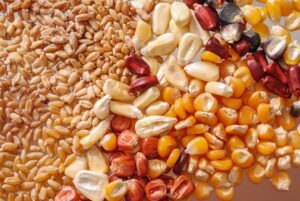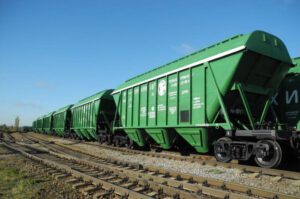
JSC “Ukrzaliznytsia” (UZ) in May 2023 transported 1836 thousand tons of grain cargo, which is 33% less than a month earlier, said deputy director of the department of commercial work UZ Valery Tkachev at a meeting with representatives of agrarian business on Thursday.
According to his information 1147 thousand tons of grain cargo were sent for export last month, which is 46% less than in April. In domestic communication 683 thousand tons were transported, which is 16% less than in April. Average daily loading in May was 44 thousand tons.
“Two factors influenced the reduction of transportation – the blocking by the aggressor of the “grain corridor”, which affected the delivery of goods by rail to ports, as well as the blocking of exports through “solidarity corridors” by European countries, which led to a halving of cargo handling through the western borders of Ukraine”, – explained Tkachev.
He added that UZ is ready to increase transportation, for which it has sufficient resources.
According to the operational data of UZ, in the first week of June 2023 the volume of grain cargo loading was 380 thousand tons, or 15% of the total cargo. Average daily volumes of transshipment during this period amounted to 54 thousand tons, which is 2.2 times higher than in April.
According to Tkachev, the actual average daily volume of agricultural cargo transshipment through the border crossings in June 2023 increased by 90 cars compared to May. Grain cargo increased by eight cars per day.
A UZ representative said that 9,740 railcars, of which 1,084 railcars with grain cargoes, are heading toward the western border. The queue for agricultural commodities has decreased by 343 cars (24%).
“Wagon congestion is ‘dissipating,’ thanks to the balancing of border loads. As long as the grain corridor works, the load on the western borders is reduced. Also transfer through European countries became more active”, – UZ representative explained.
Speaking about the transshipment of grain at the Ukrainian-Polish border, Tkachev said that in May at the checkpoint “Yagodin-Dorohusk” average daily passed 17.3 cars with grain, crossing “Izov-Grubeshov” – 20 per day, crossing “Mostiska-Medica” – 22.13 per day. At the Romanian BCP “Vadul-Siret-Dornesti” average was 47.7 w/c with grain, BCP “Dyakovo-Halmeu” – 8.5 w/c.
At the Ukrainian-Hungarian border, grain cargo transshipment in May at BCP “Chop-Zakhon” was 39.5 per/c, at BCP “Bat’ovo-Betereshki” in May transshipment of 25.6 per/c was recorded, the maximum rate in May – 93.9 per/c.
“For all Western BCPs, if we analyze the statistics of the last five months, there is a sagging of shipments from one and a half to five times. The remaining restrictions on exports with the permission of transit significantly affect the export of grain through the western borders,” – summarized Tkachev.
The head of UZ reported that, as of June 8, 2023 in the direction of the ports of Greater Odessa moves 2663 railcars with grain cargo. The average daily unloading in June is 493 cars with grain. Unloading waiting time (queue) is 4.9 days.
As of June 8, 1,656 railcars with grain cargo are bound for Port Ismail. Since May 29, the queue decreased by 23.48%. The average daily unloading for June was 122 grain cars. Unloading waiting time (queue) reaches 11.3 days.
“The work of the “grain corridor” today is difficult to predict, the aggressor country constantly changes the number of inspections of ships and puts forward different requirements, in addition the work of the port “Southern” is blocked. The situation in the port of Izmail remains difficult because of the large accumulation of cars. Loading in the port direction is planned taking into account the processing capacity of consignees/operators, but due to weather conditions they unload significantly less than planned volume,” UZ noted.

Ukraine has received about 90,000 tons of in-kind aid, such as equipment and medicines, through the EU Civil Protection Mechanism since the start of the Russian invasion, DW reported.
“This is by far the most complex, the most extensive and the longest operation under the EU Civil Protection Mechanism in the history of its existence,” said European Commissioner for Crisis Management Janez Lenarčič, quoted by the newspaper.
He said assistance was provided with food, medicine, vehicles, generators, transformers and equipment to repair power grids and other critical infrastructure.
“We even delivered items such as sunflower seeds and equipment to protect cultural monuments,” Lenarcic said.
In addition, more than two thousand patients and wounded from Ukraine have been treated in more than 20 EU countries, the commissioner added.
Ukraine officially joined the EU Civil Protection Mechanism on April 20, 2023. Within the framework of this mechanism, the EU states and other countries cooperate in preparedness and response to crises and disasters.
Thanks to the Mechanism, Ukraine has received assistance before, just like any other country in the world following a request. As a member of the Mechanism, Ukraine will have access to expert exchanges, training programs and exercises, and will be able to provide assistance to countries in crisis.

On May 9 the sea port Izmail fulfilled the annual plan of cargo handling in the amount of 6.187 million tons, which is a record in the history of the port, said the head of the State Administration of Sea Ports of Ukraine (SAPU) Yuri Litvin.
“The first position in the nomenclature of cargo of the seaport of Ismail in terms of the volume of transshipment – bread cargo, in the second – other agricultural products (oil, meal, sunflower seeds), in the third – pellets,” – said the agency on Facebook.
According to it the biggest volume of cargo handling was demonstrated by Izmail Sea Commercial Port SE (2.656 million tons), Dunaysudoremont PJSC (1.289 million tons) and Dunaysudoservis IRP PJSC (805.0 thousand tons).
The capacity of the port for the export of agricultural products has increased due to the introduction of berths for cargo operations with grains and vegetable oils by new terminal operators – JSC “Dunaysudoservis”, PJSC “Danaysudoremont”, PJSC “IPCK”, as well as due to the construction of a new terminal by “Nibulon” JV LLC, added AMPU.
“Increase of throughput capacity of Izmail sea port, which today handles a significant share of Ukrainian export, was facilitated by restoration of navigation in the mouth of Bystroe, increase of the water area of MF “Izmail” and dredging works in the port water area,” – Litvin said.
He emphasized that the Danube cluster is a key alternative route of export-import logistics, which is a priority for the further development of AMPU.
As reported, last year the transshipment in the port of Ismail increased to 8.89 million tons from 4 million tons a year earlier.
The volume of transshipment of cargo in the Danube ports by the end of this year may increase up to 20 million tons against 16 million tons last year, which is three times more than before the war, predicted Deputy Prime Minister – head of the Ministry of Reclamation Alexander Kubrakov in late April. Of these, 16-17 million tons are agricultural products.

Three dry cargo ships carrying corn and sunflower seeds left Ukrainian ports on Friday, the Joint Coordination Center (JCC) reported.
“Three ships left Ukrainian ports on December 2, carrying a total of 106,500 tons of grain and other agricultural products under the Black Sea Grain Initiative,” the report said.
Vessel Aspasia Luck is transporting 63 thousand tons of corn to China, Sea Inspiration is delivering 26.5 thousand tons of corn to Italy. Lady Perla dry-cargo carrier will carry 17 thousand tons of sunflower seeds to Bulgaria.
Three vessels, which passed through the sea humanitarian corridor on December 2, are also on their way to Ukrainian ports.
“As of December 2, the total tonnage of grain and other agricultural products exported from the three Ukrainian ports is 12,713,836 tons. A total of 1,031 vessels have been allowed to move so far: 515 to arrive at Ukrainian ports and 516 to leave them,” the report said.

JSC “Ukrzaliznytsia” (UZ) for the period September 1-21, 2022 exported a record 2.25 million tons of grain cargo since the beginning of Russian aggression, which is 40.5% more than in August (1.6 million tons), the deputy director said Department of commercial work of UZ Valery Tkachev.
“We have set another record for the transportation of goods for export – 2.25 million tons, and this is only for the 21st day of September. I think that by the end of the month we will be able to reach the figure of 2.5 million tons, maybe we will try to transport up to 3 million tons,” Tkachev said during an online meeting with industry participants on Thursday.
According to him, the company achieved such growth due to the increase in transportation of agricultural products to three Ukrainian seaports, unblocked under the Istanbul grain agreements.
At the same time, he clarified that 1,516 thousand tons of agricultural products were delivered to ports for further shipments to third countries (for the whole of August, almost half as much – 795 thousand tons), while 732 thousand tons of grain were transported through land border crossings on the western border (in August – 805 thousand tons, -9%).
According to him, since the beginning of September, Ukrzaliznytsia has loaded a total of 1.89 million tons of grain cargo into wagons (for the whole of August – 1.74 million tons), which is 27.5% of the total loaded volume for this month of 6.32 million tons (9.28 million tons were shipped for export in August).
The representative of UZ also clarified that for September 1-21, the average daily loading of the company’s wagons amounted to about 90 thousand tons (in August – 56 thousand tons), reaching a record since the beginning of Russian aggression. So, on September 20, a record 122 thousand tons of agricultural products were loaded into the cars, on September 21 – 101.4 thousand tons, on September 19 – 112.8 thousand tons, on September 18 – 83.2 thousand tons.
“Now the loading through the network has also grown significantly, in recent days we have been loading more than 100 thousand tons per day. That is, the loading through the network is growing, and this is all thanks to the opening of our grain corridor,” the deputy director emphasized during the meeting.
Over the 21st day of September, Ukrzaliznytsia also exported 89.7 thousand tons of sunflower oil, as well as 132.7 thousand tons of all kinds of meal, through land border crossings and ports.
Tkachev clarified that over the specified period, the average daily handling of wagons of all types at border crossings sank by 6% – to 1,731 thousand wagons compared to 1,848 thousand wagons on average in August, while the transfer of grain wagons amounted to 536 wagons per day, which 14% more than the average for August (469 grain wagons per day).
According to him, the most intensive movement of wagons occurs through the Izov border crossing – 157 wagons / day, Batevo – 80 wagons / day, Yagodin – 48 wagons / day, Vadul-Siret – 47 wagons / day.
The UZ representative clarified that by September 21, the total queue of wagons of all nomenclatures at the border had decreased by 24% (or by 6.64 thousand wagons) compared to September 1, to 18.96 thousand units. from 25.12 thousand units At the same time, by September 21, there were 4.78 thousand grain wagons in the queue, while on September 1 this figure was 8.48 thousand wagons with grain (-44%, or by 3.69 thousand wagons).
Tkachev noted that the queue for the delivery of grain cargo, if you look at the availability of wagons and the daily delivery, is about nine days of waiting.
“At the same time, it is clear that we have crossings where the situation is more difficult, where you have to stand for 20 days, and there are places where there is no queue. In general, we have a queue of 9 days for the presence of a wagon fleet,” the UZ representative specified.
He also stressed that after the reorientation in early September of the main flow of grain cargo in the direction of Ukrainian seaports, UZ had the opportunity to additionally receive grain cargo for export through land border crossings on the western borders of Ukraine.

SkyUp Airlines (Kyiv) is planning to transport large volumes of cargo from China to Ukraine via Poland, Romania and Moldova, and is also developing a concept for transporting cargo from the United States, for which it is necessary to go through a special procedure for obtaining FAA permits.
According to the company’s website, the company is also in dialogue with Southern Airways Express (the USA) regarding the branding of their aircraft in the colors of the Ukrainian flag and is discussing the possibility of creating “sister airlines” that could attract SkyUp employees to work on an outsourcing basis.
According to the airline’s website, in March, SkyUp performed 21 evacuation flights on the Chisinau-Tel Aviv route and transported 2,835 refugees to Israel under the repatriation program, as well as their 124 pets.
Today, SkyUp is working on the possibility of performing evacuation flights to Portugal, Sweden and the UK under the Israel-Romania program.
In addition, SkyUp agreed with Suceava Airport (Romania) on the possibility of transporting cargo. This is the closest point to the border of Ukraine.
The company has now also confirmed shipments of humanitarian supplies from Portugal and Israel to Ukraine via Poland, including helmets and clothing for the army.
It is noted that during this time the company transported 112 tonnes of humanitarian cargo. The cargo included medicines, including insulin, baby food, personal hygiene and household chemicals, blankets, diapers, etc. The cargo was distributed according to its intended purpose: for the needs of Ukrainian refugees in Chisinau and various cities of Ukraine.